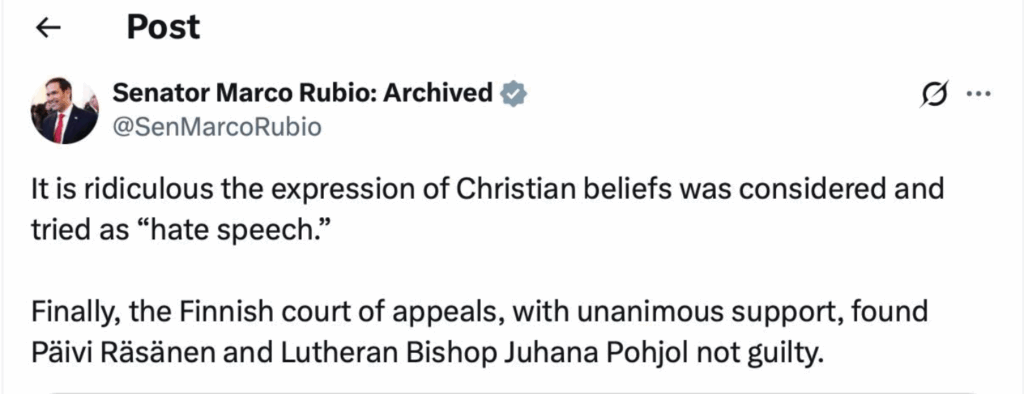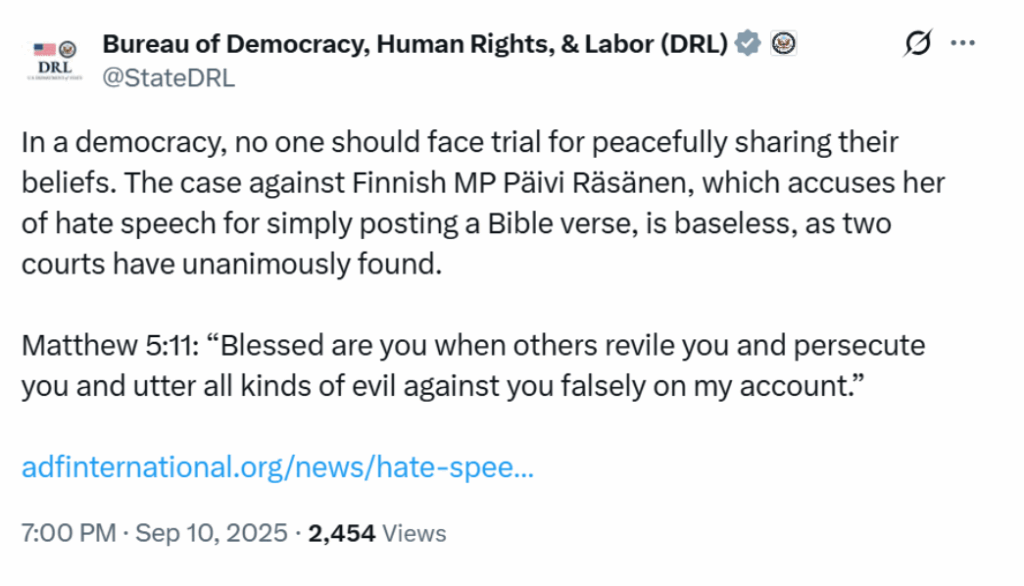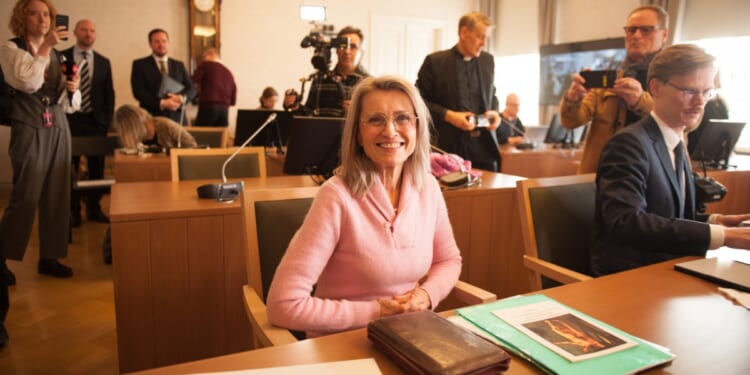As speech and religious repression tightens across Europe, Finland’s Supreme Court heard arguments Thursday about whether quoting the Bible is illegal “hate speech” under its war crimes laws. If the charges prevail, they could effectively ban Christianity in Finland.
The lawsuit brought by Helsinki’s top prosecutor targets Lutheran Bishop Juhana Pohjola and Member of Parliament Paivi Rasanen for saying what the Bible says about male and female differences. The case could reach the European Court of Human Rights, but even if it does not, it will set a precedent on whether anyone can speak freely in Europe.
“I am innocent of any crime. I have not insulted anyone, I have not spread hate,” Rasanen said in English during a virtual press conference today. “I have simply spoken what I believe to be true, out of love and conviction.”
Rasanen was first investigated for tweeting a Bible verse in 2019 to criticize Finland’s state church sponsoring a queer sex parade. Three criminal charges against her arose from the investigation, which also resulted in one criminal charge against Pohjola for publishing a booklet Rasanen wrote about the Bible’s teaching on the sexes. Investigators interrogated Rasanen for some 13 hours about her religious beliefs and rifled through the elected official’s more than 30 years of public writings and speeches.
“Any conviction would … send a dangerous message to all Christians and Christian denominations and would not build a genuinely free society proud of its rule of law,” Pohjola said in the press conference.
Two lower courts cleared Rasanen and Pohjola of all charges, but the prosecutor kept appealing, now to the North Atlantic Treaty Organization member’s highest court. In Finland, prosecutors can appeal non-convictions, unlike in many other Western countries.
What Finnish media call “the Bible trial” could have repercussions across Europe for free speech and religious liberty amid rising efforts to demolish these cornerstones of Western law. Initially, this Finnish case appeared to be the first post-Soviet example of a European government prosecuting speech, but many more have arisen since it began.
Last year, the United Kingdom arrested an estimated 30 people per day, or 12,000 per year, over alleged speech crimes, primarily on social media. Earlier this year, U.K. police arrested Irish comedian Graham Linehan for opposing men entering women’s changing areas. Citizens in Scotland and England can be arrested for silently praying near an abortion clinic, even if they are praying inside their homes. Dutch citizens can also be arrested for pro-life speech. Last year, the mayor of Brussels called riot police to shut down a conference for including pro-life and two-sexes-affirming views.
Last year the European Union, of which Finland is a member, implemented a Digital Services Act that imposes a vast web of internet censorship, potentially across the entire world, by regulating social media monopolies. The act could subject Europeans to even more fines, raids, and imprisonment for posts that observe men and women are different.
Numerous U.S. states and cities also have “hate crimes” laws on the books that prosecutors and courts use to legally harass Christians such as Colorado baker Jack Phillips for their faith: “LGBT advocates are following this case, and [if the charges prevail] it could be they would raise similar kinds of criminal complaints against very classical Christian teachings in other places,” Rasanen noted.
Agree With the Bible? See You in Court
The two Christians’ legal team described today’s Finnish Supreme Court arguments as different from their previous experiences in lower courts. The prosecutor, who has changed since the case began, didn’t ask a single question of the defendants today, and argued that even if Christian speech doesn’t cause demonstrable harm, the court should still criminalize it as “hate speech.”
“If the court would accept this argument, harmless speech would be criminalized,” said Rasanen and Pohjola’s lawyer, Matti Sankamo, who argued before the court today. He noted that it is a violation of the European Convention on Human Rights.
Punishments for violating this “hate crimes” provision of Finland’s “crimes against humanity” laws, said Alliance Defending Freedom International lawyer Paul Coleman, could include up to two years in prison. The prosecutor is seeking to have the internet wiped of Pohjola and Rasanen’s Christian speech and fines applied to Rasanen personally and to Pohjola’s charitable foundation that published her booklet titled, “Male and Female He [God] Created Them.”
“The way we see these hate speech cases working across Europe, the process becomes the punishment,” Coleman said. That “… creates a self-censorship potentially of many other people who are watching on and don’t want to go through a seven-year process for a tweet and decide not to share their opinions.”
A Rainbow Witch Hunt
The Helsinki prosecutor earlier asked courts to wipe the internet of all Rasanen’s media appearances and writings that mention the physical, psychological, and theological differences between men and women, but later narrowed that sweeping demand to specific writings and audio clips. Rasanen is a medical doctor, a nearly three-decade member of Finland’s parliament, Finland’s former Interior minister, the wife of a pastor, mother of five, and grandmother of 12.
Rasanen wrote the booklet that forms the basis of criminal charges against her and Pohjola seven years before Finland added queer sex preferences to its list of groups protected from “hate speech.” So this is also a retroactive prosecution. That is legally considered grossly abusive because people can’t know when their actions could later result in legal penalties.
During interrogations, Rasanen said, the police asked her to defend the Bible’s book of Romans and Christian theological concepts such as sin and shame, making the interrogation specifically about her religious beliefs, typically an internationally protected characteristic. Rasanen said she was interrogated by police so many times it became a joke in national media that “Paivi Rasanen is going to have another Bible study in the police station.”
After each of her three interrogations, Rasanen said the police gave her two weeks to recant her Christian beliefs and publicly apologize, or they’d file charges: “I said, ‘I do not apologize [for] what the Apostle Paul has stated, because it’s not my opinion, it’s what the word of God says.’”
The interrogations “reminded me about these times when Christians were interrogated in the Soviet Union, for example, for their Christian beliefs or having Bibles and so on, those stories that I had heard from these communist countries,” Rasanen said. “I was so shocked that something could happen like that in Finland, in a country that has long ruled in Christianity and the rule of law and freedom of speech and faith.
In fact, European hate speech laws such as those being used to prosecute Rasanen and Pohjola are a direct result of post-World War II communist influence from the Soviets.
The case is yet another of innumerable examples demonstrating that legal preferences for queer individuals are incompatible with natural rights protections for Christian religious liberty and free speech. Those historic cultural achievements for the equal protection of all developed over centuries in Western societies, in contrast with the group rights more often assigned in tribal and totalitarian societies.
Pohjola was kicked out of Finland’s state church in 2014 for holding fast to the Bible’s teaching about the sexes and marriage. He was then elected bishop of Finland’s theologically orthodox Lutheran churches. In 2022 in Kenya, Pohjola was unanimously elected chairman of an international affiliation of 55 Bible-affirming Lutheran church bodies from every populated continent, called the International Lutheran Council.
In 2022, five U.S. senators, including now-Secretary of State Marco Rubio, publicly urged U.S. diplomats to highlight U.S. concerns over Rasanen and Pohjola’s prosecutions. Rubio tweeted that the prosecution was “ridiculous.”

In 2021, six members of the U.S. House also called for U.S. diplomatic pressure on the U.S. ally over its prosecution of peaceful Christians. Under Rubio, earlier this year, the U.S. State Department condemned the prosecution as “baseless” and anti-democratic.

“I have had especially big joy,” Rasanen said in today’s press conference, that many people have told her they’ve started reading the Bible and praying because of her trial: “This has also happened to some LGBT-background people,” she noted, “so it has not been in vain to defend faith and freedom of speech during these years. It has not been in vain to speak publicly about these biblical issues that also are so important in our time.”

















